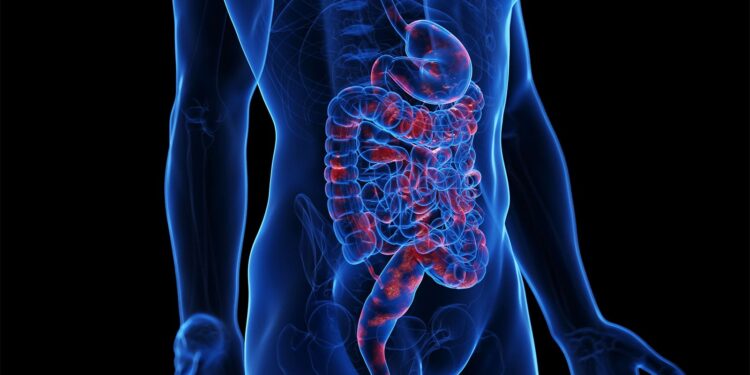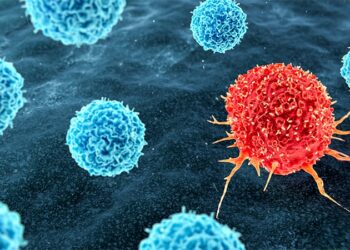An investigational oral Janus kinase (JAK) inhibitor failed to meet most primary endpoints in a phase III trial of patients with moderate to severe Crohn’s disease, but the failures might have been due to problems with study design, an expert suggested.
Across two induction studies in the DIVERSITY trial, a 200-mg dose of filgotinib met just one of its four primary endpoints for clinical remission and endoscopic response, reported Ian Beales, MD, of the University of East Anglia in Norwich, England, and co-authors in Lancet Gastroenterology & Hepatology.
Among the population previously treated with a biologic, significantly more patients treated with the JAK inhibitor achieved clinical remission after 10 weeks of induction therapy on a patient-reported two-point scale compared with those treated with placebo (30% vs 18%, P=0.0039). But the same could not be said for the study involving biologic-naive patients (33% vs 26%, P=0.096). And the co-primary endpoint of endoscopic response was not met in either group.
At the end of the maintenance portion of the trial, however, both endpoints were met in patients who received a daily dose of filgotinib 200 mg versus placebo. At 58 weeks, clinical remission rates were 44% versus 26%, respectively (P=0.038), while 30% and 9% experienced endoscopic remission (P=0.0038).
However, when results were analyzed by Crohn’s Disease Activity Index (CDAI), the 200-mg dose only appeared to show a benefit for clinical remission in the induction and maintenance phases. Researchers also evaluated a 100-mg dose of the JAK inhibitor, but no benefit was observed with that lower dose in either phase of the trial.
“Filgotinib treatment was well tolerated, and no new safety signals were reported,” the study authors said. The drug is approved in Europe for rheumatoid arthritis and ulcerative colitis.
In an editorial accompanying the study, Mark Ainsworth, MD, PhD, DMSc, of the Odense University Hospital in Denmark, pointed out several limitations in the design of the DIVERSITY trial that could have masked the efficacy of filgotinib in patients with Crohn’s disease.
Assessing endoscopic response at week 10 may have been too early, he said. For comparison, in the successful upadacitinib (Rinvoq) induction studies in Crohn’s disease, U-EXCEL and U-EXCEED, efficacy was not evaluated until week 12.
Furthermore, he said allowing considerable doses of corticosteroids for up to 14 weeks in DIVERSITY participants might have resulted in high placebo response rates that masked the effect of filgotinib. In the upadacitinib induction studies, corticosteroids were tapered after week 4, and most patients were off corticosteroids by week 11, before evaluation of clinical and endoscopic efficacy.
Finally, the upadacitinib studies used higher doses for induction than for maintenance. In DIVERSITY, the same dose was used for both. This dosing might simply have been insufficient, Ainsworth suggested.
“Is this the end for filgotinib in Crohn’s disease?” Ainsworth asked. “Can we conclude that filgotinib, as is the case for tofacitinib [Xeljanz], works for ulcerative colitis but not for Crohn’s disease?” The fact that upadacitinib proved effective for Crohn’s could be explained by differences in selectivity for different subtypes of Janus kinase, he said.
“However, as outlined above, factors related to the design might have made it difficult to show an effect of filgotinib in this particular study,” he added. “To unequivocally rule out or confirm an effect of filgotinib in induction of remission in Crohn’s disease, further studies avoiding these pitfalls seem necessary. Whether there is a commercial interest remains to be seen.”
The DIVERSITY trial was a phase III, double-blind, randomized, placebo-controlled study conducted at 371 centers in 39 countries. Participants were age 18-75 with moderately to severely active Crohn’s disease for at least 3 months.
Participants were enrolled into one of two induction studies on the basis of their experience with biological agents. Induction study A included biologic-naive patients (n=707). Induction study B included biologic-experienced patients (n=665). In both induction studies, patients were randomly assigned to receive oral filgotinib 200 mg, filgotinib 100 mg, or placebo once daily for 11 weeks.
In the maintenance study, patients who had received filgotinib and experienced an endoscopic response or clinical remission on a two-item patient-reported outcome measure (PRO2) at week 10 were re-randomized. They received their induction dose or placebo once daily for 58 weeks.
Co-primary endpoints were PRO2 clinical remission and an endoscopic response at week 10 for the induction studies and at week 58 for the maintenance study. Another endpoint, chosen to meet European Union regulations, was CDAI clinical remission (defined as a score of
Study authors said one limitation could have been that a proportion of patients who had a CDAI clinical response but not PRO2 clinical remission or an endoscopic response at week 10 may have benefitted further from filgotinib maintenance therapy if they had been eligible to enter the maintenance study.
Disclosures
The study was sponsored by Galapagos. Gilead Sciences was a collaborator for the study.
Beales reported consulting fees from Galapagos, Gilead Sciences, Janssen Pharmaceuticals, Pfizer, Pharmacosmos, Takeda, and Vifor Pharma.
Co-authors reported multiple relationships with industry.
Ainsworth reported relationships with Janssen, MSD, Takeda, and AbbVie.
Primary Source
The Lancet Gastroenterology & Hepatology
Source Reference: Vermeire S “Efficacy and safety of filgotinib as induction and maintenance therapy for Crohn’s disease (DIVERSITY): a phase 3, double-blind, randomised, placebo-controlled trial” Lancet Gastroenterol Hepatol 2024; DOI: 10.1016/S2468-1253(24)00272-3.
Secondary Source
The Lancet Gastroenterology & Hepatology
Source Reference: Ainsworth MA “Does filgotinib work for Crohn’s disease?” Lancet Gastroenterol Hepatol 2024; DOI: 10.1016/S2468-1253(24)00304-2.
Source link : https://www.medpagetoday.com/gastroenterology/inflammatoryboweldisease/113259
Author :
Publish date : 2024-12-06 17:23:25
Copyright for syndicated content belongs to the linked Source.


![author['full_name']](https://newshealth.biz/wp-content/uploads/2024/12/JAK-Inhibitor-Comes-Up-Short-in-Phase-III-Crohns-Disease.jpg)












